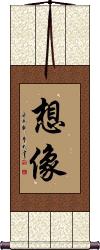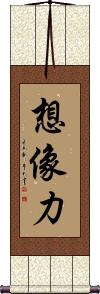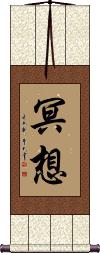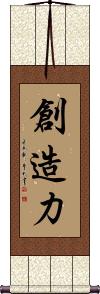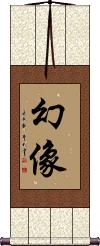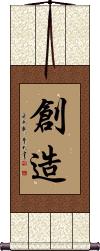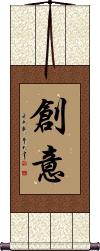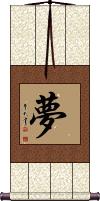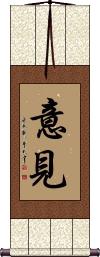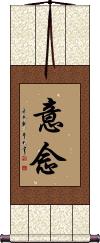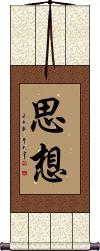Many custom options...
And formats...

Imagine Imagination in Chinese / Japanese...
Buy an Imagine Imagination calligraphy wall scroll here!
Personalize your custom “Imagine Imagination” project by clicking the button next to your favorite “Imagine Imagination” title below...
Imagine / Imagination
想像 is the shortest word for imagine, visualize, or imagination.
It can also mean “to guess,” (which is why I favor the 3-character version of imagination (just a third character is added to the end, which clarifies it).
Imagination
想像力 is probably the best way to express “imagination” in Chinese, Japanese Kanji, and old Korean Hanja.
It literally means “your strength to imagine.” The last character means strength or ability, while the first two mean imagine or conceptualize. My Japanese dictionary defines this as “The power of imagination.” While my Korean dictionary says, “imaginative power.”
Meditation
This encompasses the idea of meditation.
It's also a term used to describe a deep form of daydreaming, exploring one's imagination, the act of contemplating, or the idea of contemplation. 冥想 is often associated with Buddhism; however, the word “Zen” in Japanese (or “Chan” in Chinese) is probably more commonly used (or better known in the west).
See Also: Zen
Creativity
創造力 is a word that means “strength of creativity” or sort of “creativity (is your) strength.”
This can also be translated as “ingenuity.”
Creativity is the power of imagination. It is discovering your own special talents. Daring to see things in new ways and find different ways to solve problems. With your creativity, you can bring something new into the world.
The first character means “to create,” and the second means “to make or build.” Together they mean “creative.” The third character means “strength.”
Illusion
幻像 is a universal word for Illusion in Chinese, Japanese Kanji, and old Korean Hanja.
The first character means phantasm, vision, dream, illusion, apparition, or fantasy.
The second character means statue, picture, image, figure, portrait, shape, form, appearance, to be like, to resemble, to take after, to seem, or in rare/ancient context: an elephant.
![]() Note that the first character can be written without the left-side radical in Chinese. This form is shown to the right. Both forms are acceptable in Chinese but the character shown to the right is more likely to be read as "elephant."
Note that the first character can be written without the left-side radical in Chinese. This form is shown to the right. Both forms are acceptable in Chinese but the character shown to the right is more likely to be read as "elephant."
See Also: Reality
Create / Creation
創造 means to create, to bring about, to produce, or simply creative or creation.
The first character here means to create, Genesis, or origin.
The second means to make or build.
Creative / Creativity
創意 is creative or creativity in Chinese characters, old Korean Hanja, and Japanese Kanji.
It can also refer to an original idea or originality.
Unbridled Creativity
不拘一格 is a Chinese proverb that speaks of exploring different styles and not being stuck in conventional thinking.
It can also be translated as “not sticking to one pattern” or “not limited to one type (or style).” The most simple translation is “being creative” or “unbridled creativity.” Some may also say this means “not being stuck in a rut,” in the context of a designer or artist.
If you translate this, the first two characters mean “not stick to” or “not confine oneself to.”
The second two characters mean “one mode,” “one pattern,” “one form,” “one style,” or “one rule.”
Dream / Dreams
夢 is the very simple word for dreams in Chinese and Japanese.
It can also mean having a vision or simply an illusion.
Idea / Thought
意見 means idea, thought, opinion, or view in Japanese.
This word also has a similar meaning in Chinese, just often used in China.
Idea / Thought
Thought / Thinking / Idea
思想 means thought, thinking, or idea in Chinese, Japanese Kanji, and old Korean Hanja. Sometimes it can mean ideology, depending on context.
This can refer to someone's personality - like saying, “he is a thinker.”
The following table may be helpful for those studying Chinese or Japanese...
| Title | Characters | Romaji (Romanized Japanese) | Various forms of Romanized Chinese | |
| Imagine Imagination | 想像 | souzou / sozo | xiǎng xiàng xiang3 xiang4 xiang xiang xiangxiang | hsiang hsiang hsianghsiang |
| Imagination | 想像力 | souzouryoku sozoryoku | xiǎng xiàng lì xiang3 xiang4 li4 xiang xiang li xiangxiangli | hsiang hsiang li hsianghsiangli |
| Meditation | 冥想 | mei sou / meisou / mei so | míng xiǎng ming2 xiang3 ming xiang mingxiang | ming hsiang minghsiang |
| Creativity | 創造力 创造力 | souzouryoku sozoryoku | chuàng zào lì chuang4 zao4 li4 chuang zao li chuangzaoli | ch`uang tsao li chuangtsaoli chuang tsao li |
| Illusion | 幻像 幻像 / 幻象 | gen zou / genzou / gen zo | huàn xiàng huan4 xiang4 huan xiang huanxiang | huan hsiang huanhsiang |
| Create Creation | 創造 创造 | sou zou / souzou / so zo | chuàng zào chuang4 zao4 chuang zao chuangzao | ch`uang tsao chuangtsao chuang tsao |
| Creative Creativity | 創意 创意 | sou i / soui / so i | chuàng yì chuang4 yi4 chuang yi chuangyi | ch`uang i chuangi chuang i |
| Unbridled Creativity | 不拘一格 | bù jū yī gé bu4 ju1 yi1 ge2 bu ju yi ge bujuyige | pu chü i ko puchüiko |
|
| Dream Dreams | 夢 梦 | yume | mèng / meng4 / meng | |
| Idea Thought | 意見 | i ken / iken | yì jiàn / yi4 jian4 / yi jian / yijian | i chien / ichien |
| Idea Thought | 意念 / 意唸 意念 | yì niàn / yi4 nian4 / yi nian / yinian | i nien / inien | |
| Thought Thinking Idea | 思想 | shisou / shiso | sī xiǎng / si1 xiang3 / si xiang / sixiang | ssu hsiang / ssuhsiang |
| In some entries above you will see that characters have different versions above and below a line. In these cases, the characters above the line are Traditional Chinese, while the ones below are Simplified Chinese. | ||||
Successful Chinese Character and Japanese Kanji calligraphy searches within the last few hours...
